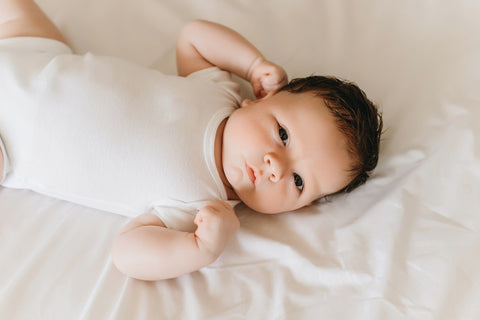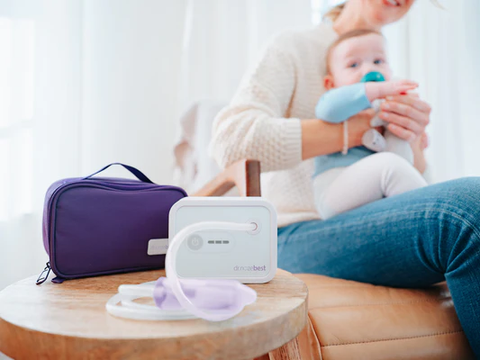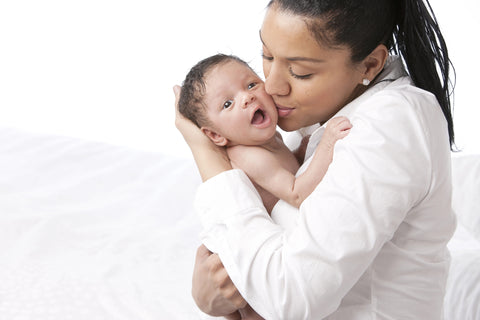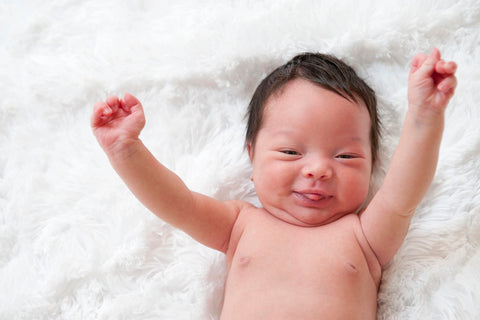As a parent, it’s easy to feel overwhelmed trying to figure out if your newborn’s sneezing is part of their natural development or a sign of something else.
In many cases, sneezing is completely normal! But if the sneezing becomes excessive or is accompanied by other symptoms, it may be time to visit a doctor.
In this article, we discuss what causes newborn sneezing, when to take action, and how to prevent sneezing from becoming a problem.
Table Of Contents
- What Causes Newborn Sneezing?
- When To Take Action For Newborn Sneezing
- How To Prevent Excessive Sneezing
What Causes Newborn Sneezing?

Reflex Development
Sometimes, a sneeze is just a sneeze. It’s nothing more than your baby’s body learning how to function outside the womb.
Newborn sneezing — and all sneezing, for that matter — is controlled by the nervous system, which isn’t fully developed when your baby is born.
A sneeze or two here and there may just be your baby’s nervous system running a test to build strength in the new reflex so it’s ready when needed.
Irritants
One of the main purposes of your baby’s nose is to keep airborne material — like dust, smoke, pollution, and other irritants — from reaching their lungs.To keep airborne material as far away from their lungs and sinuses as possible, your baby’s body may react by sneezing. This forceful expulsion of air helps remove irritants from their nose and mouth to keep those airways clear for breathing.
Irritants that may cause newborn sneezing include:
- Dusty environments
- Pet dander
- A trip from the country into the city
- Baby’s first campfire
- The time of year (e.g., spring when the pollen count goes up)
Be on the lookout for these situations, and do your best to minimize your little one’s exposure.
Tiny Nasal Passages
Babies are born with tiny nasal passages, so even a relatively small amount of an airborne irritant — something that wouldn’t bother you in the least — can set off the newborn sneezing reflex.
If you travel outside the home and notice your little one start to sneeze, there may be something in the air that’s too much for their tiny nasal passages and developing immune system.
Try changing locations to see if the sneezing stops. Just remember that a sneeze here and there is perfectly normal!
Illness
Newborn sneezing is a normal biological behavior, but it can also signal that something else is wrong in your baby’s body. If your baby gets sick, they’ll start sneezing in an attempt to expel the illness from their body.
In this case, sneezing is a symptom of a deeper issue that may require medication. Consult with your little one’s pediatrician if you suspect they might have caught a cold.
When To Take Action For Newborn Sneezing

Increasingly Frequent Sneezing
Even frequent newborn sneezing may be completely normal. But if the number of your baby’s sneezes increases from one day to the next, it may be a sign that something else is going on inside their little body.
While there’s no set number of sneezes considered “frequent,” if your baby suddenly goes from two or three an hour to eight or nine an hour, it might be time to visit the doctor.
Similarly, if their sneezing is accompanied by other symptoms, your little one may have caught a cold. Talk with a pediatrician about getting your baby treatment for any underlying illness.
Coughing
Coughing and sneezing together — typically without the other symptoms on this list — are often a sign that your baby has been exposed to airborne irritants their body can’t handle. They cough and sneeze to get those irritants out.
Your little one could be allergic to something nearby or, in some cases, it could be the first signs of a cold or the flu.
If your baby is coughing and sneezing but doesn’t have a runny or stuffy nose, try changing environments (moving away from the irritant) to see if that helps.
If the coughing and sneezing persist, schedule an appointment with your baby’s pediatrician.
Trouble Breathing
If your baby is sneezing and having trouble breathing (e.g., their breathing sounds raspy, shallow, or forced), get them checked out by a pediatrician right away.
They may be allergic to something in their environment or may have caught a cold that their body can’t shake.
Keep in mind that breathing trouble could be a symptom of something more serious. Talk to a doctor as soon as possible.
Stuffy Nose

Newborn sneezing and a stuffy nose often go hand in hand and can be very uncomfortable for your little one. Newborns breathe primarily through their nose and are not yet used to breathing through their mouth. That can make a stuffy nose all the more difficult for your little one.
If your baby develops a stuffy nose, try the Dr. Noze Best NozeBot to clear their nasal passages and restore normal breathing activity.
Here’s how to do it:
- Place your index and middle fingers into the finger grip of the nosepiece
- Allow the tubing to drape over the back of your hand
- Turn on the device
- Choose your level of suction (we recommend always starting on low)
- Gently place the nozzle into your baby’s left nostril
- Switch the nozzle to your baby’s right nostril
That’s it — baby can breathe easy again. Hooray!
Loss Of Appetite
If your little one is sneezing excessively and doesn’t eat as much or as often as they usually do, it may be a sign that they’re not feeling well or their body is trying to fight off an infection.
Keep in mind that your little one’s appetite may change from one feeding to the next or from one day to the next, and that’s completely normal. But if this change is accompanied by other symptoms (like sneezing), talk to a pediatrician as soon as possible.
Fever
A fever is a sure sign that your baby has come down with something. Talk to your doctor right away to find out which treatments are the safest and most appropriate for your newborn.
Note: Avoid giving your baby any medication before consulting a doctor or other trained professional. They can tell you which medications to try and how much to give.
Unusual Sleepiness
It’s hard work fighting off a cold, so if your baby seems more sleepy than usual and is suffering from excessive newborn sneezing, it might be time to schedule a doctor visit.
Until you can talk to a pediatrician or other medical professional, make your little one as comfortable as possible and let them sleep when they want to so their body can direct energy to fighting the infection.
How To Prevent Excessive Newborn Sneezing

Wash Your Hands
Irritants that may lead to newborn sneezing are often transferred from you to your baby through your hands.
If you put your baby down for a time — or let someone else hold them — wash your hands before picking them up again. This minimizes the chances that you’ll expose your little one to something that may make them sneeze.
Consider Breastfeeding
Breast milk contains antibodies that can help your baby fight off infections that lead to coughing, sneezing, and a stuffy nose.
Breast milk also contains properties that help stimulate your little one’s immune system so that it grows as strong as possible.
Even if you can’t breastfeed directly for whatever reason, consider pumping and storing breastmilk to feed your little one when they’re hungry.
Keep Baby’s Environment Clean
A great way to minimize irritants that can lead to newborn sneezing is to keep your baby’s environment clean.
That may mean:
- Dusting several times a week
- Vacuuming carpets or sweeping hard floors
- Keeping pets out of your baby’s room
- Limiting the furniture that pets can sit on
- Closing windows when pollen counts are high
- Running the air conditioner to filter out dust and other irritants
Don’t feel that you have to clean your living space top to bottom every day, but do your best to keep dust at bay so it doesn’t tickle your baby’s nose.
Cover Your Mouth When You Sneeze Or Cough
The best way to reduce the risk that your little one will catch something is to cover your mouth when a tickle in your nose or throat leads to a sneeze or cough.
The most effective method is to grab a tissue or a handkerchief, but those items aren’t always handy. In a pinch, sneeze or cough into your elbow rather than your hand.
Healthy Baby, Happy Baby

Newborn sneezing can be a nerve-wracking experience for new parents, but fortunately, there’s no need to dash to the doctor’s office the first time you hear “Achoo!” Your baby’s body may simply be developing as normal.
But if the sneezing persists, is accompanied by other symptoms, or becomes frequent or excessive, consult with a pediatrician as soon as possible.
And, remember, a healthy baby is a happy baby! So, to prevent newborn sneezing from becoming a bigger issue:
- Keep your little one’s environment clean
- Wash your hands before holding them
- Cover your mouth when you sneeze or cough
- Consider breastfeeding if at all possible
Follow these tips and use the Dr. Noze Best NozeBot when stuffy noses strike, and your little one will feel better in no time.
If you enjoyed this article, you may also love:
- Is It RSV, Flu, COVID-19, or a Cold?
- The Ultimate Guide to Introducing Allergen-Friendly Foods to Babies
- How to Not Get Sick During The Winter (Proven Pediatric ENT Recommended Hacks)
- How to Prepare for Your Baby’s First Cold
- Common Mistakes Parents Make When Their Infant or Child is Sick
The Nozebot is a battery-powered suction device designed to clear nasal congestion in babies and children.



